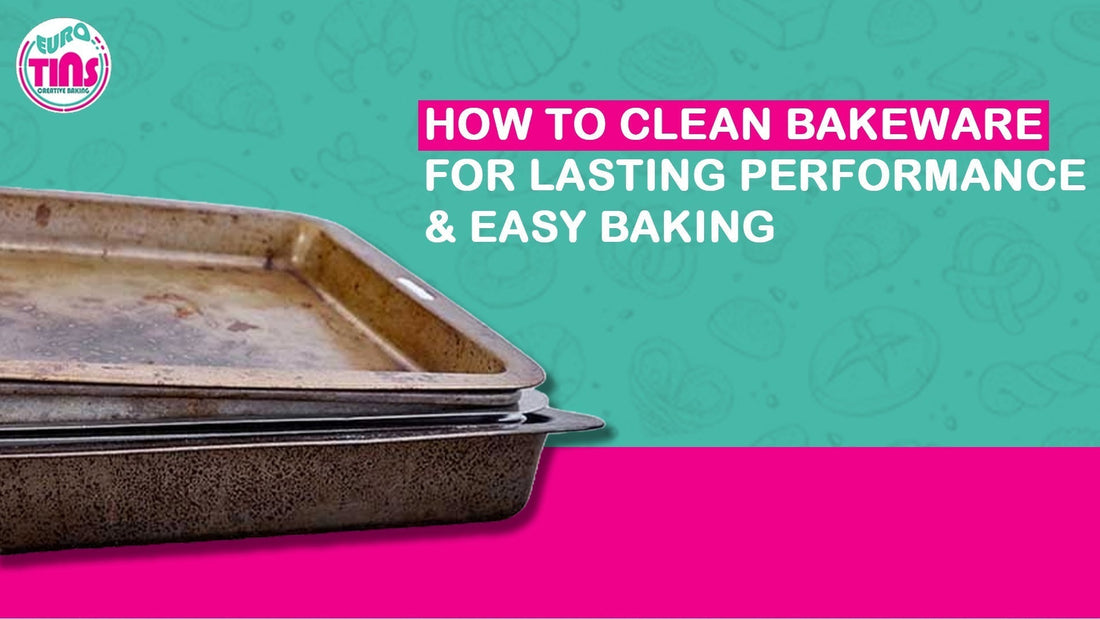Anyone who has pulled a golden-brown loaf or a batch of cookies from the oven knows the joy of baking. But once the treats are gone, the stubborn residue clinging to the baking tray often remains. What begins as a delightful culinary experience ends with a chore most try to avoid. That sticky aftermath can be a menace, and if not handled properly, it can compromise your bakeware over time.
Understanding how to clean bakeware without damaging it is not just a useful kitchen skill but a necessary part of baking longevity. For those serious about their results, it is not just about scrubbing but about preserving the tools that help perfect every recipe.
Why Baking Trays Get So Dirty So Fast
Baking trays are exposed to direct heat, fats, oils, sugars, and sometimes food particles that get burnt into the surface. This happens more often with
-
High-temperature baking that causes fats and grease to carbonise
-
Sweet recipes where sugar caramelises and burns onto the surface
-
Using parchment inconsistently, causing batter spills to touch metal
-
Repeated baking without proper deep cleaning between uses
Over time, this grime hardens, oxidises, and becomes increasingly difficult to remove.
Choose the Right Cleaning Techniques by Material
Different tray materials require different care. Knowing which method suits which material avoids accidental damage and improves the results of your cleaning routine.
Aluminised Steel and Aluminium Bakeware
These trays conduct heat exceptionally well but tend to darken with use. Avoid harsh chemicals and the dishwasher, which can pit the surface.
-
Use a paste made from baking soda and hydrogen peroxide. Spread it across the surface, allow it to sit for several hours, and rinse thoroughly.
-
For surface dullness, use lemon juice and cream of tartar. This combination can brighten the metal without abrasion.
Non-Stick Baking Trays
Non-stick coatings are delicate. Scouring pads or aggressive cleaners will strip the finish.
-
Soak in warm water with dish soap immediately after use
-
Use soft sponges only
-
To tackle greasy buildup, apply a mixture of baking soda and water, then gently wipe it away
Stainless Steel Trays
Durable and rust-resistant, these can endure more vigorous cleaning.
-
Use vinegar and baking soda together for stuck-on grime
-
Bar Keepers Friend is another effective cleaner for stainless surfaces
-
Rinse well to prevent spotting
Glass Baking Dishes
Thermal shock can crack these, so avoid extreme temperature changes.
-
Let the dish cool before soaking in warm, soapy water
-
For baked-on food, use baking soda and a plastic scraper
-
Rinse with vinegar to enhance clarity
Silicone Moulds and Sheets
These may feel easy to clean at first glance, but silicone absorbs grease more easily than other materials.
-
Boil silicone bakeware in a pot of water with a few lemon slices
-
Let it cool, then wash with baking soda paste to remove lingering grease
How to Remove Specific Types of Baked-On Residue
The method of cleaning should match the problem. How to handle the most common challenges.
1. Baked-On Grease
-
Soak trays in hot water and dish soap for at least thirty minutes
-
Sprinkle baking soda on the greasy surface
-
Pour vinegar over it to create a gentle fizzing reaction
-
Scrub with a non-abrasive pad
2. Caramelised Sugar and Burnt Spots
-
Sprinkle coarse salt on the area
-
Add a few drops of lemon juice
-
Let it sit, then use a nylon brush to scrub
-
Repeat as necessary
3. Rust Spots on Metal Trays
-
Use a mixture of lemon juice and salt
-
Let it sit for twenty minutes
-
Scrub with the cut side of a potato dipped in baking soda
-
Rinse and dry thoroughly
4. Odours and Sticky Residue on Silicone
-
Submerge in boiling water with vinegar
-
After cooling, scrub with a baking soda paste
-
Air dry in sunlight to neutralise remaining smells
Cleaning Tools That Make a Difference
Having the right cleaning tools can cut your time in half and save your trays from damage.
-
Soft-bristled brushes
-
Non-abrasive pads
-
Microfiber cloths
-
Plastic scrapers for stuck-on messes
-
Silicone-safe sponges
Cleaning Mistakes That Can Shorten Bakeware Lifespan
Baking trays are investments, and unintentional misuse can degrade them prematurely.
-
Avoid using metal utensils that scratch surfaces
-
Never stack wet trays, which can lead to rust
-
Skip the dishwasher for aluminium and non-stick trays
-
Do not use oven cleaner unless the tray is labelled safe for it
Eurotins Commitment to Long-Lasting Bakeware
Eurotins understands that high-performance bakeware deserves exceptional care. That is why our trays are designed not only for premium baking but also for easier maintenance. Our range includes:
-
Heavy-duty aluminised steel trays with superior thermal conductivity
-
Food-safe non-stick coatings that resist buildup
-
Rust-resistant stainless steel tins crafted for long-term durability
When customers trust us for advice on keeping trays clean, they begin to trust us for everything else in their kitchen. We are more than a bakeware brand. We are a baking partner.
Final Thought
Knowing how to clean bakeware is not just about aesthetics. It is about performance, hygiene, and durability. When your bakeware is properly maintained, it rewards you with consistency and confidence.
And when it comes to finding bakeware that can handle both the heat and the cleaning, Eurotins is your name to remember.
FAQs
How often should I deep-clean my baking trays?
If you bake frequently, a deep clean every two to three uses helps prevent buildup and prolongs the life of your tray. For lighter use, once a month is sufficient.
Can I use vinegar and baking soda on non-stick trays?
Yes, but use the mixture gently and apply it with a soft sponge. Avoid scrubbing too hard, as the bubbling reaction is already effective on grease and residue.
Is it safe to clean rusted bakeware and keep using it?
If the rust is minimal and can be scrubbed off completely, the tray can still be used. Be sure to dry thoroughly and store in a low-humidity environment.
What is the best way to prevent future grime buildup?
Always line trays with parchment or silicone mats. Clean trays immediately after cooling, and avoid leaving baked-on messes overnight.
Can I use baking soda on all types of bakeware?
Yes, it is safe for most surfaces, including aluminium, stainless steel, and silicone. Avoid using it on non-stick coatings without diluting it into a paste.




